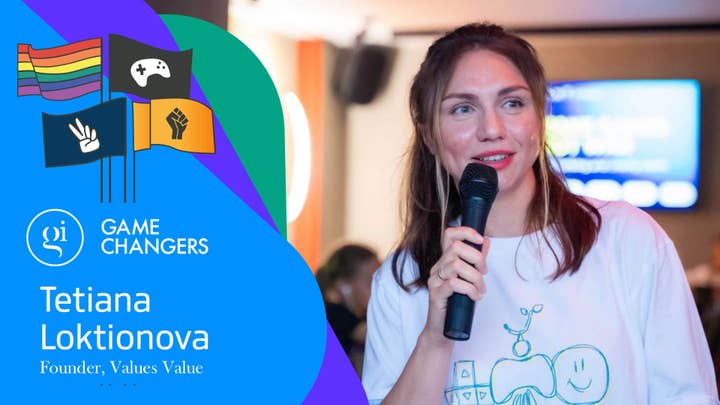Game Changers | Tetiana Loktionova
The Values Value founder shares more on how she helped Ukrainians relocate and find employment after the Russian invasion began
Sign up for the GI Daily here to get the biggest news straight to your inbox
GamesIndustry.biz Game Changers is a series of profiles on the groups and individuals going the extra mile to make the games industry a better place. These interviews encompass folks from around the world helping to improve conditions and attitudes towards diversity, equity, inclusion, accessibility, mental health and more. You can read more Game Changers interviews here.
On February 24, 2022, Russia invaded Ukraine.
Later that day, Tetiana Loktionova was in a bank in Cyprus sorting out some of the finances for her company, the games-centric recruitment agency Values Value, when she overheard another customer asking how they could donate €100 to help Ukrainians in need. Knowing Loktionova was from Ukraine, they asked if she could recommend some links to authorised fundraisers, which she did.
It was the first of many, many actions Loktionova took to support people, especially games professionals in her home nation.
"I'm ethnically Russian," she tells GamesIndustry.biz. "My mother was Russian, my father was Russian and I was born in Russia, but at the age of nine months we relocated to my father's hometown in Eastern Ukraine. I have always considered myself Ukrainian – even when I got my passport, I filled in Ukrainian as my nationality."
With over a decade of experience in the games industry, Loktionova began her career as a PR manager, later leading Ukrainian studios and offices at companies like Playrix, before venturing into recruitment as both founder of Values Value and co-founder of InGameJob.com.
"I'm ethnically Russian [but] I have always considered myself Ukrainian"
Among the many initiatives she has been a part of, she was instrumental in the creation of a video course introducing aspiring developers to careers in the games industry – which over 8,000 people took part in. She also launched the Big Games Industry Salary Survey, produces the Talent Management track at the DevGAMM conference, and produced a manual to help developers identify when they're feeling signs of burnout – further examples of her efforts to assist people in finding their place within the industry.
Last year, she dedicated much time and effort to helping Ukrainians not only relocate and escape the war, but also secure employment elsewhere in the games industry. In fact, she has precedent for this.
"When the war actually started in 2014, I was a COO at Nika Entertainment and I helped relocate 80 employees and their families," she says. "It was a very dark and hard time. But we helped, and we shared our experience with other companies on how to organise it, how to do it right."
When protests rose up in Belarus over President Alexander Lukashenko seeking a sixth term in office, and some of those protestors were imprisoned, many deemed Belarus to be unsafe and tried to leave. Loktionova and her colleagues advised companies and individuals on how they could relocate to Ukraine – although she now acknowledges that some of these will have had to relocate again in 2022.
"When the war started last year, it was absolutely natural for me, and for anyone on my team, to start helping," she says. "Everyone around me started doing anything they could manage to help – unless they were also relocating."
Intuition had led Loktionova to move herself and her family to Cyprus on February 20 – just four days before the invasion began – in order to ensure the safety of her children. This also gave her the breathing room to work out how best she could aid those who needed it.
"We saw a lot of Ukrainian people flee to different countries, and they didn't know what to do next," she says. "So I gathered around 30 volunteers from different countries and they helped us to gather and update information on how each country helps, what the process was, what documentation they needed and so forth. It's a huge manual, and it helped hundreds of people."

Much of this was accomplished through what she refers to as "Facebook and LinkedIn activism." She began by reaching out to every non-Russian-speaking connection she had on LinkedIn with information on how they could help, where they could donate and how to spread this information. She emphasised that the Ukrainian games industry employed 30,000 people, all of whom needed help – hopefully from the millions of other games professionals around the world.
She also set up a form for Ukrainian developers to explain what aid they required, and another for international companies to detail what help they could offer, from relocation and housing to legal and financial aid, as well as employment. Hundreds of companies filled in this form.
"I know that at least 300 people were hired in this way by June – and that's just the ones I know about," adds Loktionova. "The companies were so eager to help, and we saw a great amount of volunteers from Ukraine and the games industry.
"I'm just a little part of this, but without such parts, without everyone doing something, a lot of this would have been impossible."
In addition to these efforts, she's been key to InGameJob's #StandUpForUkraine initiative – a non-profit effort to connect companies with developers fleeing the war – and organised a charity fundraiser, Make Games Not War, which raised over $15,000. She and her team have also been supporting other efforts, including Games For Ukraine, Gamedev Camp and Gamedev Under Bombs.
When the war began in 2014, and in the following years, Loktionova says there was "no such huge wave of volunteers," nor were efforts quite as organised. The 2022 invasion was different.
"In the very first days, everyone in the business was thinking about how to help their own teams – myself included," she says. "The CTO of InGameJob spent several days under bombing in a basement with his wife and small child. Our recruitment business partner saw tanks and bombs from her window, and she and her family had to flee the very second they woke up. We were trying to help as much as we could, and the businessmen were trying to make their businesses as resilient and protected as possible.
"We stopped any business operations for two weeks, and we also had to think about our future approach of working with Russia and Belarus-related companies. We were one of the first ones to make a statement about stopping relations with any Russia-related businesses."
"Some companies were expecting to hire a really cheap workforce, people in a very difficult situation and who have no other opportunities"
Equally, the industry at large responded with far more force than in previous years. Dozens of companies launched fundraisers or made significant donations to aid humanitarian efforts in Ukraine. But while Loktionova is grateful for all the help she received helping to employ affected Ukrainians, she says that some firms' motives weren't entirely altruistic.
"Ukraine, let's admit it, was considered to be part of the third world and it was expected that the salaries would be really low here. But they're not," she says.
"Some companies were expecting to hire a really cheap workforce, people in a very difficult situation and who have no other opportunities. Some businesses, outsourcers and recruitment companies like us, were faced with the situation where they thought we should be paid much less than the others – but why? Because we're in a hard situation?"
She adds that the best way for the industry to support Ukrainian games businesses is to employ their services, especially the various outsourcers and service providers still operating in the country, or to invest in studios striving to continue working. Right now, this is the best way to support Ukrainian gaming companies – to support the game developers by investing in them.
"I understand the risks, and I understand why some companies – especially big companies – will face problems," she says. "Big companies do not want to deal with sanctions, or manage the list of occupied territories [which keeps changing]. When a place is occupied, it's under the sanctions list. Some companies are saying they now don't work with Ukrainian businesses… what? Why? They can still hire Russian citizens, but not Ukrainians.
"Invest in Ukrainians, continue to take their jobs applications seriously. Don't be afraid of hiring remote Ukrainians. Men are not allowed to leave the country, unless they have three kids, are older than 60, or meet other conditions – so please hire remotely. Everyone can work remotely. If you're looking for an outsourcer, try to find a Ukrainian team to help you. You'll be surprised."
Overall, she is grateful for the industry's response to the war in Ukraine, and notes that more aid was given than was publicly disclosed. Some companies, especially those with assets in Russia, kept their donations and their support quiet. Loktionova also notes that while there was a strong initial wave of support, that diminished significantly in the second half of the year – despite the ongoing war.
"It also depends on the shift from humanitarian aid and aid for refugees to what Ukraine really needs now, which is the armed forces," she says. "Most companies' internal policies do not let them [donate to this]. I understand that, it's money, it's business.
"Looking back on 2022, how hard it was and how hard it is still, I'm proud of being part of the games industry"
"I'm proud of being part of the games industry. Looking back on 2022, how hard it was and how hard it is still, I'm proud. The way the community and the media reacted, everyone in my bubble."
She shares that "there were some disappointments, especially on the Russian-side of the community," but adds that there has been close ties between the games development communities in Ukraine, Russia and Belarus.
"There were people who I considered my friends, people where I thought we were alike, and it turns out we're totally different. This is the biggest loss I had last year, this disillusionment about the network I built."
Going forward, Loktionova hopes to further increase awareness about the Ukrainian games industry. She plans to update the list of volunteers and put more of an emphasis on promoting Ukrainian outsourcers and service providers worldwide.
"The companies from Ukraine, they need some time to survive 2023," she says. "That's why it's a very good idea to support Ukrainian businesses and conferences, so that we can integrate better into the international community, and so that we are strong enough to rebuild the industry in Ukraine, to make it prominent again. We need to preserve those people and businesses."
She concludes: "I totally admire Ukrainians. I've talked to a number of leaders and they say, especially in the games industry, people love what they do. They do it because it's their vocation. They say their team hasn't lost any productivity or performance compared to the previous year.
"Imagine being really depressed, having this shock in this very, very emotionally hard environment, facing hardships with your family and friends – Ukrainians have found their work-life balance. Or war-work-life balance. Our job helps us to survive, to stay focused and focus on something we're interested in, something we love, not just a job for a job's sake but a job you enjoy. Imagine how important it is being under war, under bombs, how important it is to do what you enjoy."

